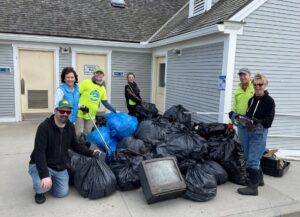 HYANNIS – Colorectal cancer used to be a disease of the elderly, but that trend is changing due to better screening of older Americans and an alarming rise in new cancers among young people.
HYANNIS – Colorectal cancer used to be a disease of the elderly, but that trend is changing due to better screening of older Americans and an alarming rise in new cancers among young people.
A few years ago, the American Cancer Society proposed an initiative called “80% by 2018,” with the goal of increasing colon cancer screening to 80 percent of the population age 50 or older. If this goal is met, they project more than 200,000 fewer deaths from colon cancer between the years 2013 and 2030.
At 78 percent rate of screening, Massachusetts is leading the pack according to Peter Hopewood, MD, of Cape Cod Surgeons in Falmouth, and an active member of the Cancer Committee at Falmouth Hospital. The average for the rest of the country is about 60 percent, he said.
But now an ominous new danger is becoming apparent. While colon and rectal cancers have been declining in older Americans, the rates have risen sharply in the younger population.
A new study published last month in the Journal of the National Cancer Institute indicates that people born in 1990 have double the risk of colon cancer and quadruple the risk of rectal cancer than those born in 1950, according to lead author Rebecca Siegel, an epidemiologist with the American Cancer Society.
“In the medical world, we’ve known that has been going on for two or three years,” said Dr. Hopewood. “I think it just hit the news.”
Obesity May Be The Culprit
The huge increase can’t possibly be explained by genetic factors, so it must be environmental, he said. Falmouth Hospital recently had two patients under the age of 40 diagnosed with colon cancer and genetic testing came back negative in both cases.
While there are smoking gun links between radon and lung cancer or pesticides used on cranberry bogs and leukemia, no one knows why colon cancer rates are rising in young people, Dr. Hopewood said.
The authors of the study and Dr. Hopewood believe the obesity epidemic is to blame.
The study points to research that indicates that unhealthy dietary trends like eating high-glycemic load carbohydrates (white bread, cake, donuts, packaged cereal) triggered inflammation and changes in the colon within two weeks in Japanese immigrants who adopted an American diet. Other studies show a significant one-generation increase in the incidence of colorectal cancer from Japanese migrants that is directly connected to diet.
“We know the things that cause colon cancer,” Dr. Hopewood said. “It’s red meat, processed food, being overweight and not exercising. Diet, obesity and lack of exercise are the same three causes for a lot of cancers.”
Know The Symptoms
The biggest concern with younger people having an increased risk for colon cancer is that they aren’t screened for it, said Dr. Hopewood. Most screening begins at age 50, unless there is a strong genetic component.
“If someone comes in with abdominal cramps and a change of bowel habits and they’re 30, most doctors will think it is irritable bowel syndrome,” he said. “I think there needs to be more awareness of the symptoms. Unfortunately, if you have symptoms like bleeding or a partial blockage, it usually means that you’ve already got cancer and it’s not particularly early. It’s going to be at least a stage two or three.”
The American Cancer Society lists the following symptoms of colorectal cancer:
- A change in bowel habits, such as diarrhea, constipation, or narrowing of the stool, that lasts for more than a few days
- A feeling that you need to have a bowel movement that is not relieved by having one
- Rectal bleeding with bright red blood
- Blood in the stool, which may make the stool look dark
- Cramping or abdominal pain
- Weakness and fatigue
- Unintended weight loss
- Low red blood cell count
With no regular screening in place for those under 50, the best advice Dr. Hopewood can give is to eat a diet high in fiber and low in processed food and red meat, and exercise regularly.
“At some point, we keep saying the same things over and over again,” he said. “Unfortunately it’s behavior change and the hardest thing to change is behavior.”
He also suggested that with this new development, it might be prudent to begin screening at a younger age with a stool test, at the very least, for people who might be at higher risk because of unhealthy lifestyle choices.
Colon cancer is not the only cancer linked to obesity. According to the American Cancer Society, the other cancers are:
- Breast cancer
- Endometrial cancer
- Esophageal cancer
- Gastric cardia (a type of stomach cancer)
- Liver cancer
- Gallbladder cancer
- Pancreatic cancer
- Kidney cancer
- Meningioma (a type of brain tumor)
- Thyroid cancer
- Multiple myeloma (cancer of the white blood cells)























